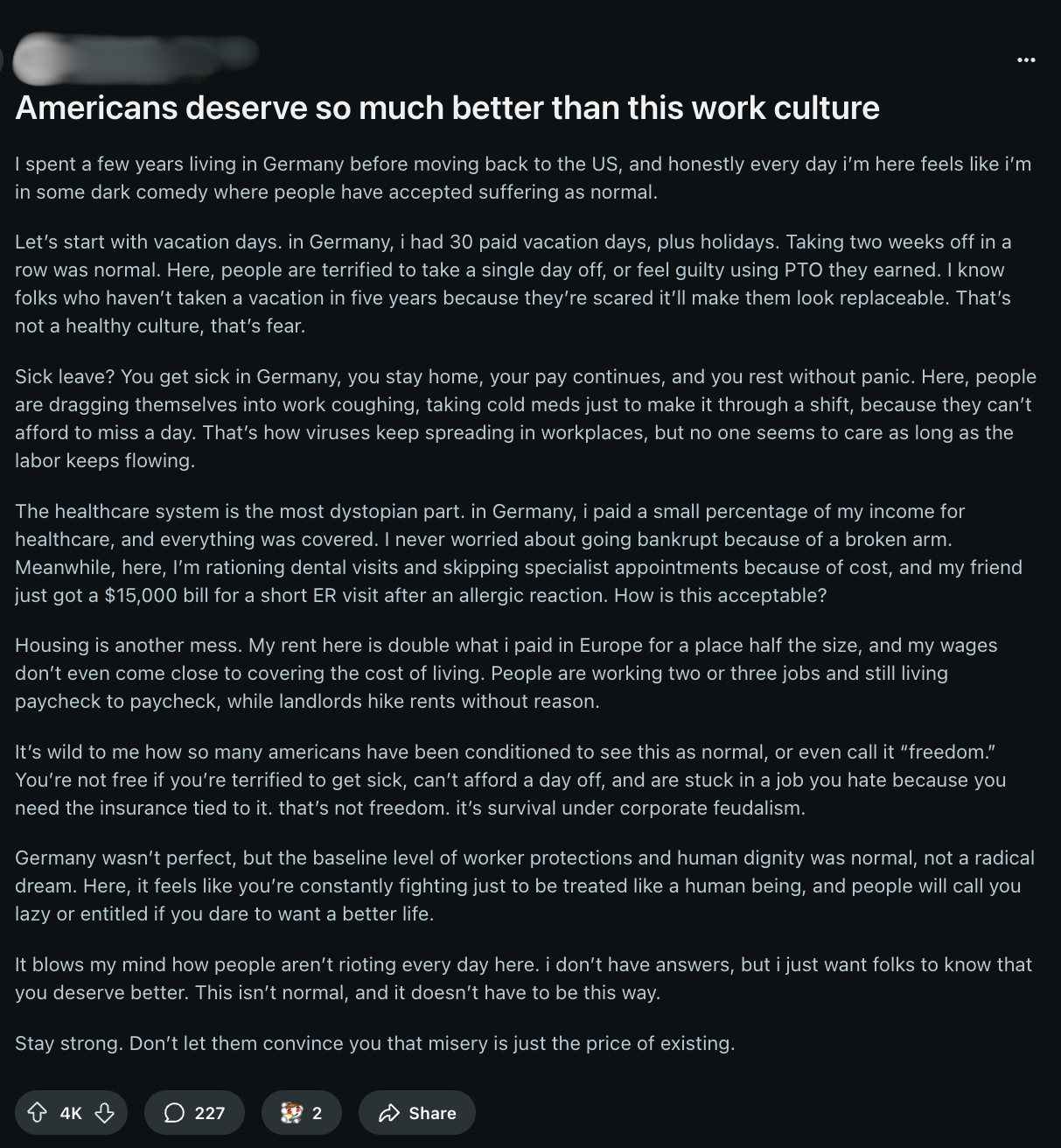For generations, the American workplace has championed the “hustle”: long hours, 24/7 connectivity, and an identity deeply tied to one’s job title. But in recent years, educators, young professionals, and employees across industries are turning their gaze across the Atlantic. What they see in Europe is a radically different vision: one in which rest is not a luxury, but a right, and work is integrated into life, not the other way around. This contrast has never been more pronounced, a reality highlighted by a viral Reddit post, where US workers and expats recount real experiences highlighting the gulf between the two work cultures.

A Reddit user highlights the contrast between work cultures in Germany and the US.
Europe’s balance vs. America’s hustle
The following comparison outlines how Europe’s protective labor laws and cultural values promote rest and wellbeing, while the U.S. work environment often prioritises extended hours and productivity at the expense of personal time.
The tradition of American overtime
At the heart of American work culture lies a potent mix of ambition and insecurity:
- Long hours and limited time off: Full-time employees often receive just 10–14 days of paid leave per year, with no federal mandate for paid vacation at all. Many describe months-long stretches without a single weekday break, an experience widely discussed on social platforms. One commenter explained going four months between days off, reflecting a norm that makes recovery and personal pursuits challenging.
- Workplace identity and presentee-ism: For many Americans, work defines self-worth. Stories from the Reddit post recount fears about requesting even a single day off. Workers noted, “In the US, I’m afraid to take even a day off,” echoing a widespread reluctance to use leave due to concern over job security and professional perception.
- Job insecurity and health coverage: The at-will employment system means workers can be let go with little notice. Employees face tangible risks if they fall ill or take extended leave, as health insurance is often tied directly to employment. The threat of unexpected medical bills, such as a $15,000 emergency room charge cited by one user, adds yet another layer of anxiety.
These conditions foster a culture where “hustle” and burnout are normalized, and work-life boundaries are frequently sacrificed for job safety.
The European right to paid time off
Europe’s model is defined by legal rights and collective social values:
- Generous and protected time off: Most European countries offer 20–30 days of paid annual leave, upheld by law. Extended holidays and month-long absences are not only accepted but expected. The Reddit post described how, in Germany, “vacations were assumed—not begged for,” highlighting this fundamental difference.
- Evenings and weekends off-limits: Policies like France’s “right to disconnect” mean that employers are legally barred from contacting staff after work hours. Sacrosanct personal time is the default across much of Europe.
- Stable employment and social safety nets: European workers benefit from robust job protections and universal healthcare, removing the fear of losing both income and medical coverage with a single job change. The same Reddit discussion cited Walmart’s German operation, where employees received two years’ salary as severance, an outcome unimaginable in most American workplaces.
What American workers wish they had
The appeal of the European model stands out sharply against the U.S. hustle approach:
- Better mental and physical health: Statistics and anecdotal evidence from the Reddit thread reinforce that regular, uninterrupted time off leads to reduced burnout and improved life satisfaction.
- Greater job and life satisfaction: The certainty of protected rest and fair treatment was often cited by those who had experienced both systems. Workers felt empowered to enjoy family life, hobbies, and travel, with one commenter noting the freedom to “take two weeks off at a time” without jeopardising job security.
- Reduced anxiety around job loss and healthcare: The fear of financial catastrophe over a single health event, a common worry for Americans, was notably absent from European accounts. Workers described moving jobs, taking leave, and even getting sick without the risk of losing insurance coverage or enduring insurmountable debt.
Work-life balance as the norm, not the exception: Those who had spent time in Europe were unanimous: work is an important part of life, but not its entirety. The ability to switch off “mentally and literally” was described as not only refreshing but crucial to long-term productivity.
The bottom line
Employee testimony, supported by research and illustrated in viral online discussions, makes it clear: the European approach to work offers a sustainable blueprint for healthier, happier teams. As American workers reckon with exhaustion and the limits of hustle, many are now looking to Europe’s balance of ambition and well-being as the model for workplace reform. The growing chorus of voices recalls a simple, but powerful, truth: when time off is protected and health is assured, everyone benefits.TOI Education is on WhatsApp now. Follow us here.